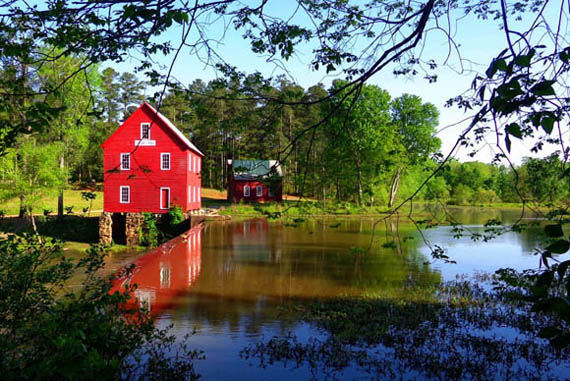I mentioned in the previous entry that it has become increasingly
difficult for us to make spontaneous decisions about where we're going
to stay when we travel in our RV.
Our decision to stop overnight at this
Texas state park is an anomaly based on a poor weather forecast for the
place we originally planned to spend the night -- a Walmart
parking lot farther to the west..
While we were at Brazos Bend State
Park we heard that a cold front with high winds from the west
was expected along our route through southern Texas today. Since warnings were
issued for tall vehicles on I-10, we had to decide whether to stay longer
at Brazos Bend or drive fewer miles today.

South Llano River near the park
entrance
While researching our options I noticed another state park that isn't
too far off the freeway, about 300 miles west of Houston.
That certainly sounded better than our original plan to drive more
than 500 miles today. After looking at the park's website, I called to
see if any sites were available tonight (campgrounds are usually more
full on weekends). The ranger said yes.
Since we really wanted to continue forward, we aimed for this park a
few miles south of Junction. Although we were driving into a headwind
with gusts of perhaps 20-30 MPH we didn't have any trouble with the
Cameo on the freeway. We would have stopped earlier if wind was a problem.
CAMPGROUND INFORMATION
South Llano River State Park is located near the southwestern edge of
Texas' scenic "Hill Country." Driving across Texas on I-10 the terrain
becomes increasingly hilly and more scenic west of San Antonio. The park
is about ten miles south of Junction.
We checked in at the campground in mid-afternoon and had our choice
of more than half of the 58 RV sites with water and 30-amp electrical
hookups. A dump station is located at the beginning/end of the
campground loop. Our fee was only $20/night with our Texas state park pass.
We picked a large, rather secluded site at the end of the loop that
was easy for Jim to back into:
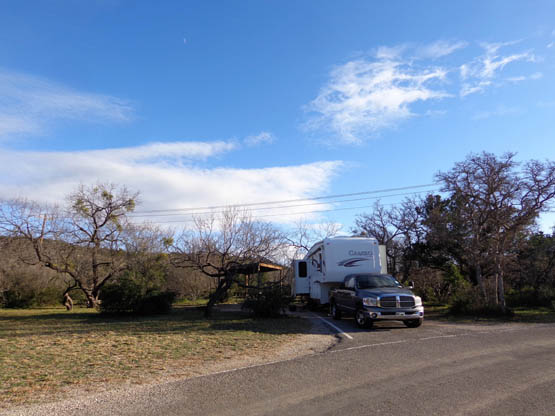
This is a very nice campground with lots of trees. Our site was flat
and spacious, with plenty of room to walk the dogs in our grassy "yard."
It was shaded on two sides by several large trees and shrubs.
RV pads are pea gravel; each site has a nearby covered picnic
table on a concrete pad:

Since the temperature got down to 27 F. overnight we
didn't hook up the water. Jim put 30 gallons of fresh water in our tank
and we just used our onboard water pump. Although it was sunny and in
the 50s during the afternoon it felt much colder with all the wind.
The park is in a river valley surrounded by hills. Our only complaint
about staying here was not having an internet signal with our Verizon
mobile hotspot for our phones or laptop computers or any TV reception
with our RV antenna.
Since we stayed only one night it wasn't a big deal, but for that
reason I doubt we'll stop there on our way back home.
PARK ACTIVITIES
This is a relatively new state park. All the land was donated to the
state of Texas by the Buck family in the 1980s. All the old buildings
remain from this once-busy farm, including several houses and barns used
for various purposes -- raising cattle, sheep, goats, and pecans.
The next two pictures show a cluster of buildings. One of the older
houses is used for the visitor center/office where we checked in:
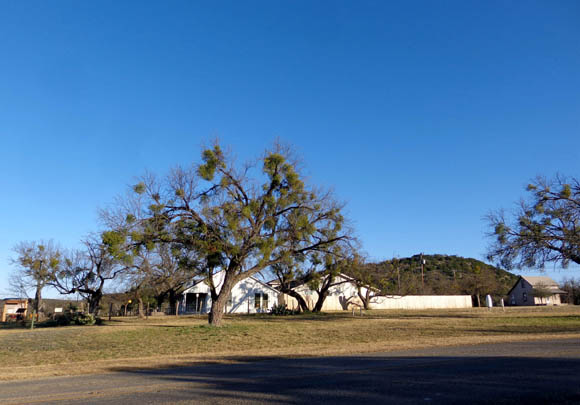

On my walk, I took pictures of a picturesque old barn that was used
for sheep-shearing:


It is along the park entrance road and near one of four different
bird blinds I saw:

The bird blinds have rooms
(above) from which to watch birds
rest and feed in a yard full of
trees and water (below).

There are about 25 miles of hiking and cycling trails in the park,
ranging from easy to difficult.
Some of the paths that are closest to the campground and the easiest
to walk are through fields that are roosting areas for turkeys. From
October to March these trails are open only from 10 AM to 3 PM. We
arrived too late to walk in those fields:


Sign about the roosting turkeys near the river
This park is one of the state's oldest and largest Rio Grande turkey
roosts. Up to 800 turkeys live here during the winter. They roost in the
trees at night and are easily disturbed; hence, the limited hours
visitors are allowed on trails through that area in winter.
The turkeys breed in the spring and the hens leave for nesting sites
elsewhere to raise their young.
This picture of a turkey tom and hen are from the park's website. We
didn't see any turkeys during our visit.

In addition to the turkeys, about 220 other species of birds have
been spotted in the park.
Although we didn't see any turkeys during our short visit to this
park we did see several kinds of birds and some armadillos along the
entrance road and path that follows it:
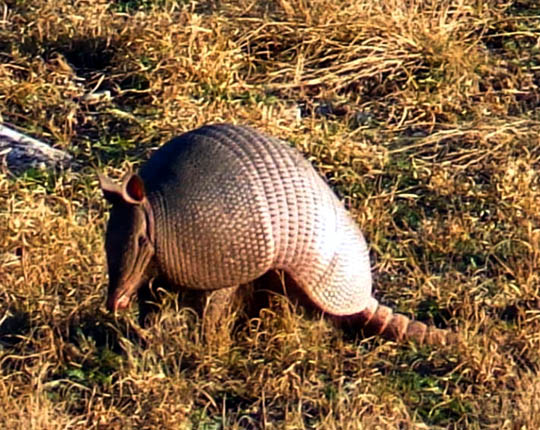
We also saw a lot of white-tailed deer and handsome black bucks that look like
antelope with twisted horns as we drove into the park on Friday:

I saw dozens of the deer and bucks when I walked out to the river
just before sunset. They kept darting across the road in front of me but
not close enough to take good photos of them.
After we got set up in our campsite we took the dogs out for a
four-mile walk in and near the campsite and out toward the river. I
continued along the entrance road on an adjacent pea-gravel path to the
river so I could take some pictures of it:


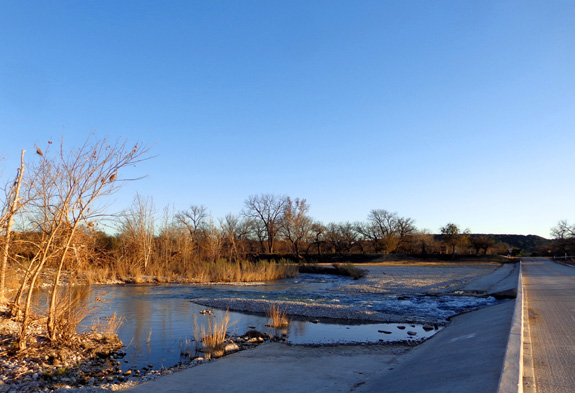

In addition to camping, hiking, photography, and watching wildlife,
other activities you can do at South Llano State Park include cycling,
star gazing (it's a dark-sky park), fishing, paddling/floating, and
geo-caching. The spring-fed river has reportedly never run dry.
Hiking and biking
trails range from easy in the lowlands
to rugged on backcountry ridges.
Check out the park's official
website for additional camping,
recreational, and historical information, including maps.
Next entry: a fun week at a new campground for us,
Lost Dutchman State Park in Arizona
Happy trails,
Sue
"Runtrails & Company" - Sue Norwood, Jim O'Neil,
Cody, Casey, and Holly-pup
Previous
Next
© 2018 Sue Norwood and Jim O'Neil
